|
|
|
Sort Order |
|
|
|
Items / Page
|
|
|
|
|
|
|
| Srl | Item |
| 1 |
ID:
162281
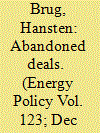

|
|
|
|
|
| Summary/Abstract |
High profile deals emphasize the costs of the merger and acquisition (M&A) process particularly when deals fail before closure. However, beyond anecdotal evidence, we do not know why some M&A deals in the electricity and gas industries are abandoned. We analyze a sample of over 5000 M&As in the electricity and gas industries. The three most important factors affecting M&A abandonment are if the acquirer engaged in a divestiture at the same time, whether the target firm was publicly owned, and if the acquirer already had a toe-hold (part ownership) in the target firm at the time of the M&A deal. An M&A deal is 10.17% less likely to be abandoned if the acquirer engaged in a divestiture at the same time. An M&A involving a publicly owned target firm is 9.87% more likely to be abandoned. Lastly, an M&A in which the acquirer had a toe-hold in the target company is 7.87% more likely to be abandoned. Our findings show that policy makers and practitioners should be aware that the M&A process is affected by often over-looked deal or firm specific factors.
|
|
|
|
|
|
|
|
|
|
|
|
|
|
|
|
| 2 |
ID:
149971
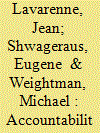

|
|
|
|
|
| Summary/Abstract |
The Fukushima-Daiichi Accident demonstrated the need of assessing and strengthening institutions involved in nuclear safety, including the accountability of regulators. There are a few problems hindering the path towards a greater understanding of accountability systems, the ensemble of mechanisms holding to account the nuclear regulator on behalf of the public. There is no consensus on what it should deliver and no systematic assessment method exists.
|
|
|
|
|
|
|
|
|
|
|
|
|
|
|
|
| 3 |
ID:
149927
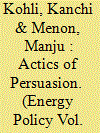

|
|
|
|
|
| Summary/Abstract |
Following the earthquake of 2001 in the Kutch district of Gujarat (India), the state government and corporate investors have focussed on the coastal areas of Kutch, India's largest district, for economic and infrastructure development. Within a decade of industrialisation of this landscape, these projects have had profound impacts on the environment, livelihoods and futures of its Kutchi inhabitants. Today, the coastline between the old Kandla and Mundra ports is drawn into a three-way battle between International Financial Institutions (IFIs) investing in coal projects, technical experts of sustainable development and international anti-coal campaigners. These three groups have selectively engaged the project affected Kutchis on the importance of economic development, environmental management and climate change. But the affected local people comprising artisanal fisherfolk who belong to a minority community, economically powerful salt and agricultural farmers and a traditional pastoral community of camel herders, frame, debate and act upon the impacts of the project in pragmatic ways. The range of remedies sought by them can be located between the practical expediency of everyday life and ethical questions about correct action. These remedies offer a glimpse of what regulatory bodies should be paying attention to rather than abstract or procedural justice.
|
|
|
|
|
|
|
|
|
|
|
|
|
|
|
|
| 4 |
ID:
179678


|
|
|
|
|
| Summary/Abstract |
Countries are making important efforts decarbonising their electricity generation mix. In this context, improving the operational efficiency enables better use to be made by renewables and the grids. However, the location of new capacity might be relevant from the social welfare point of view when private decisions might affect the power system efficiency.
|
|
|
|
|
|
|
|
|
|
|
|
|
|
|
|
| 5 |
ID:
110751
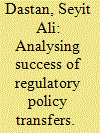

|
|
|
|
|
| Publication |
2011.
|
| Summary/Abstract |
Economic regulation of public utilities has become a worldwide phenomenon with the preceding privatisation stream. It is questionable to transfer regulatory models hastily without customising the policy options or introducing necessary institutional reforms enabling the achievement of expected results of regulatory reform. Institutional configuration of a country affects credibility of regulatory commitments, quality of regulatory design, and way of policy transfer. Turkey's energy market regulation experience confirms the decisive role of institutions in shaping the regulatory framework.
|
|
|
|
|
|
|
|
|
|
|
|
|
|
|
|
| 6 |
ID:
188934


|
|
|
|
|
| Summary/Abstract |
Over the past decades, there has been a steady increase in the number of people involved in ‘flexible’ labour, more commonly known as ‘gig’ work. This has stimulated discussions over its various characteristics, including the lifestyle, mental health, fair treatment and overall well-being of gig workers. This article seeks to understand how the plight of gig workers can be reduced by effective regulation. For this, the authors identify seven characteristic features of the gig economy that harm the workers’ well-being. Then, the authors explain mechanisms in which the plight of these workers resulting from these seven factors can be reduced through efficient regulation. For this, the authors incorporate particular suggestions offered by some scholars outside India and modify them to suit the Indian context better. The authors also forward novel methods to regulate the gig economy. This article first defines and describes the gig economy. After that, it discusses various aspects like the quality of life, position of women and workplace dynamics of the gig economy. Then, this article recommends seven ways in which the sufferings of the workers can be reduced, and the gig economy can be better regulated in India.
|
|
|
|
|
|
|
|
|
|
|
|
|
|
|
|
| 7 |
ID:
109711


|
|
|
|
|
| Publication |
2011.
|
| Summary/Abstract |
This article presents the main regulatory changes that occurred in the Brazilian power sector in 2009, along with the impacts these changes caused on the market, especially related to small hydropower (<30 MW). This study addresses regulatory issues based on inventory studies and records of basic projects, changes related to the compensation of the assured energy of SHPs in the Brazilian energy reallocation market, the socio-economic impact resulting from the construction of SHPs, SHPs in alternative resource auctions and finally the general outlook for the growth scenario for SHPs in Brazil according to the ten-year plan (2010-2019). The overall conclusions of this investigation were that the 2008/2009 biennium was a period of great changes in the regulation of small hydropower plants in Brazil, and the SHP market has shown maturity. Additionally, despite SHP being a type of technology that is completely dominated by domestic industry, in recent years, they have experienced policy disincentives caused by changes to rules that inhibit their growth.
|
|
|
|
|
|
|
|
|
|
|
|
|
|
|
|
| 8 |
ID:
165906


|
|
|
|
|
| Summary/Abstract |
This article offers an analysis of the influence of the anti-mercenary norm on the United Nations’ use of services provided by private military and security companies (PMSCs). It follows a constructivist approach which focuses on violations of the anti-mercenary norm within the UN system and on the justifications and condemnations of these violations in official UN documents. The findings suggest that while the anti-mercenary norm is no longer puritanical, two key aspects of the norm—the lack of a proper cause and the lack of control—remain influential within the UN system. Although all parts of the UN system nowadays routinely use a wide variety of services of PMSCs and the UN Secretary-General officially sanctioned security outsourcing in 2011, the UN continues to insist that it is only using PMSCs as a last resort, when no other options are available. The continuing need to justify the use of PMSCs’ services suggests that this practice challenges both the long-established identity of the UN as a key anti-mercenary norm entrepreneur and its ontological security.
|
|
|
|
|
|
|
|
|
|
|
|
|
|
|
|
| 9 |
ID:
121316


|
|
|
|
|
| Publication |
2013.
|
| Summary/Abstract |
The anticipated expansion of offshore wind energy in the U.S. has been the subject of considerable legislative effort. The Energy Policy Act (EPAct) of 2005 and the Outer Continental Shelf Lands Act (OSCLA) detail the criteria the federal government must follow when allocating leases for offshore wind farms. The Bureau of Ocean Energy Management (BOEM) provides primary federal oversight to offshore wind in federal waters, and in 2009 they released their formal management guidelines going forward. This research examines lease allocation methods BOEM may use, as well as several promising alternatives, through the lens of the mandated criteria set forth by OSCLA and the EPAct of 2005. We find significant variation between allocation methods in terms of how well they meet each of the criteria. Price-based allocations will have difficulty in meeting criteria while also accounting for the immature status of the offshore wind energy industry. Instead, a multiple factor approach which includes non-monetary considerations may be a more appropriate way to balance federal mandates and industryneeds.
|
|
|
|
|
|
|
|
|
|
|
|
|
|
|
|
| 10 |
ID:
128423
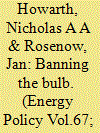

|
|
|
|
|
| Publication |
2014.
|
| Summary/Abstract |
Much academic attention has been directed at analysing energy efficiency investments through the lens of 'behavioural failure'. These studies have challenged the neoclassical framing of regulation which emphasises the efficiency benefits of price based policy, underpinned by the notion of rational individual self-mastery. The increasing use of a regulatory ban on electric lamps in many countries is one of the most recent and high profile flash points in this dialectic of 'freedom-versus-the-state' in the public policy discourse. This paper interrogates this debate through a study of electric lamp diffusion in Germany. It is argued that neoclassical theory and equilibrium analysis is inadequate as a tool for policy analysis as it takes the formation of market institutions, such as existing regulations, for granted. Further still, it may be prone to encourage idealistic debates around such grand narratives which may in practice simply serve those who benefit most from the status quo. Instead we argue for an evolutionary approach which we suggest offers a more pragmatic framing tool which focuses on the formation of market institutions in light of shifting social norms and political goals-in our case, progress towards energy efficiency and environmental goals.
|
|
|
|
|
|
|
|
|
|
|
|
|
|
|
|
| 11 |
ID:
118241
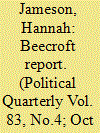

|
|
|
|
|
| Publication |
2012.
|
| Summary/Abstract |
The Coalition government made a commitment to review employment law to ensure flexibility for both parties and enhance business's competitiveness. This led the prime minister to ask venture capitalist Adrian Beecroft to undertake the task of identifying the areas of employment law that presented the greatest burden, and making recommendations for reform. The Beecroft report identifies 16 areas for reform, but the lack of evidence to support his conclusions severely undermines his case. The challenge of increasing employment in a stagnant economy is substantial, and Beecroft's recommendations, if implemented, are unlikely to make a difference. Businesses need to see increased demand and access to finance if they are to take on more workers, but government must also develop a long-term vision of the UK labour market and address weaknesses that existed before the financial crisis.
|
|
|
|
|
|
|
|
|
|
|
|
|
|
|
|
| 12 |
ID:
144825
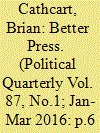

|
|
|
|
|
| Summary/Abstract |
Writing recently in The Political Quarterly, the journalist John Lloyd took issue with regulatory remedies for ‘bad journalism’ in the United Kingdom that were proposed by the Leveson inquiry of 2011–12 and endorsed by Parliament in 2013 in the form of a Royal Charter. State action will fail, he asserted, because only journalists can change journalism, and he urged British journalists to undertake this transformation. This response argues that Lloyd dismisses the Leveson process too lightly and takes too little account of the many victims of press abuses, who are entitled to better protection. A decent society had to do something about this, and the Leveson Charter process was a measured and constructive response that offers the best hope of higher press standards and of protection for ordinary citizens while safeguarding freedom of expression for journalists. Lloyd's proposal for action by journalists, by contrast, is impractical, not least because it ignores powerful forces preventing journalists from taking control.
|
|
|
|
|
|
|
|
|
|
|
|
|
|
|
|
| 13 |
ID:
098366


|
|
|
|
|
| Publication |
2010.
|
| Summary/Abstract |
This article applies the problem of civilian control over the military to the realm of private military contractors. The author argues that military outsourcing strips the principal -agent relationship of many of the structures and dynamics that states have traditionally used to control militaries. Many of the same qualities that make private military corporations successful as both economic actors and political surrogates also lead to reductions in the possibility for effective civilian control. The author supports these claims through an examination of the multilevel, fragmented, and global nature of the private military corporation market, with particular attention to divisions within the labor force. The implications of this analysis are that using private military corporations raises persistent challenges and tensions for effective state control that cannot be easily regulated away.
|
|
|
|
|
|
|
|
|
|
|
|
|
|
|
|
| 14 |
ID:
166540
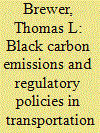

|
|
|
|
|
| Summary/Abstract |
The paper assesses evidence concerning the effects of transportation's black carbon emissions on climate change, public health, and food production; and it discusses policy issues posed by the emissions. Black carbon emission mitigation policies at all levels offer significant potential climate, health, and food co-benefits, and they are attractive in terms of economic cost-effectiveness and political feasibility. The paper presents an analysis of regulatory issues in maritime shipping and aviation, which are increasingly salient, and which are largely independent of the revelations of “diesel gate” in the motor vehicle industry. Yet, there are linkages in the technological and policy issues of the motor vehicle industry and issues confronting maritime shipping and aviation. Black carbon emissions are among the core regulatory policy issues in all three industries, and they have not been adequately addressed by policymakers. The paper concludes with specific policy recommendations at all governance levels.
|
|
|
|
|
|
|
|
|
|
|
|
|
|
|
|
| 15 |
ID:
149904
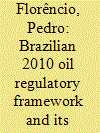

|
|
|
|
|
| Summary/Abstract |
Investment is an essential variable in the oil sector. It is even more important in the vast Brazilian pre-salt domains, where the technological requirements are high and sophisticated. The Brazilian National Oil Company, Petrobras, is facing severe financial limitations to undertake these disbursements. Other oil companies will therefore have to be significantly engaged in the endeavour, which reinforces further the importance of attracting investments in Brazil. Yet this article shows that the governance architecture established in the 2010 Brazilian oil framework will deter investments in several ways, giving rise to agency problems among entities and moral hazard situations because of contractual legal liabilities. There are some credible indications that the government of President Lula overestimated the attractiveness of the Brazilian pre-salt oil discoveries and their capacity to draw investments when proposing the 2010 changes. Little attention was given to the careful examination of how the framework would affect investors, under the assumption that the favourable geological conditions would be sufficiently attractive in themselves. Even though the 2010 reforms have brought some minor advancements and there have been some signs that the government has been recently attempting to mitigate some of the problems examined in this article, that is not enough.
|
|
|
|
|
|
|
|
|
|
|
|
|
|
|
|
| 16 |
ID:
133233
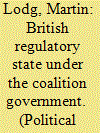

|
|
|
|
|
| Publication |
2014.
|
| Summary/Abstract |
What have been the effects of coalition government on the British regulatory state? This article argues that the politics of regulation have been largely about a continuation of existing patterns, namely volatile stability rather than more far-reaching change. The British regulatory state continues to be defined by boundary conflicts between the world of 'politics' and 'regulation', by conflicting calls for centralisation and decentralised autonomy, and by tensions between the wish to 'reduce' regulation and the realisation of inherent complexities.
|
|
|
|
|
|
|
|
|
|
|
|
|
|
|
|
| 17 |
ID:
099265


|
|
|
|
|
| Publication |
2010.
|
| Summary/Abstract |
Climate change legislation requires emissions reductions, but the market shows interest in investing in new fossil fuelled power plants. The question is whether capture ready policy can reconcile these interests. The term 'capture ready' has been used a few years by the UK Government when granting licences for fossil fuelled power plants, but only recently has the meaning of the term been defined. The policy has been promoted as a step towards CCS and as an insurance against carbon lock-in. This paper draws on literature on technology lock-in and on regulation of technology undergoing development. Further, versions of the capture readiness concept proposed to date are compared. Capture readiness requirements beyond the minimum criterion of space on the site for capture operations are explored. This includes integration of capture and power plant, downstream operations, overall system integration and regulation of future retrofitting. Capture readiness comes with serious uncertainties and is no guarantee that new-built fossil plants will be abatable or abated in the future. As a regulatory strategy, it has been over-promised in the UK.
|
|
|
|
|
|
|
|
|
|
|
|
|
|
|
|
| 18 |
ID:
148811


|
|
|
|
|
| Summary/Abstract |
Uniquely among the world’s temperate forests, much of the vegetation of the Caspian forests is now endangered. But while deforestation has accelerated in Iran, these processes were actually underway in the nineteenth century. This article offers a brief introduction to the history of forest exploitation and concessions during the Qajar and Pahlavi periods, addressing actions taken by the Iranian state to protect and extend forest cover, but also the deficiencies of that legislation and the reasons for its failure. Though it is one of the most forested countries in the Middle East, Iran’s forests remain understudied. Existing scholarship mostly addresses the contemporary period; this paper extends the scope of our knowledge, offering a deeper history of forest exploitation in Iran.
|
|
|
|
|
|
|
|
|
|
|
|
|
|
|
|
| 19 |
ID:
099331


|
|
|
|
|
| Publication |
2010.
|
| Summary/Abstract |
Throughout the history of the electricity industry, regulatory reform has been driven by the pursuit of tools able to create conditions that would favour infrastructure investment and, generally, to surmount the obstacles that hinder system expansion. This article addresses the interaction between regulatory schemes and electric power generation investment, with a review of the changing role of the State in the expansion of electricity supply in Latin America. It contains a critical assessment of changes in the regulatory framework since the outset of electric power market reform, describing the successive approaches to regulation adopted in the last three decades. The aim of this analysis is to help identify the key factors underlying the evolution of energy policies and to contribute to the formulation of a prospective view of the direction this evolution may reasonably be expected to take.
|
|
|
|
|
|
|
|
|
|
|
|
|
|
|
|
| 20 |
ID:
145677


|
|
|
|
|
| Summary/Abstract |
Promoting Private Security Company (PSC) self-regulation has become a key focus due to high profile scandals during the military interventions in Iraq and Afghanistan. Related efforts include the Montreux Document, the International Code of Conduct for Private Security Service Providers (ICoC), American National Standards Institute/ASIS certification, and the new International Standards Organization (ISO) Management System Standard for Private Security Operations. Implicit in industry self-regulation, however, is the assumption that the consumers of private security services will help facilitate and enforce professional standards by shifting their custom to PSCs which have signed up to these codes of conduct or certification schemes. This article investigates the validity of this assumption with regard to government contracting. To what degree are public agencies able – and willing – to let professional standards guide their contracting behaviour? To answer this question, this article develops a general framework for the analysis of public consumer influence through choice, voice, and exit which draws on insights from microeconomics and Albert Hirschman’s classical treatise Exit, Voice, Loyalty. Taking the United States government as an illustrative example, the analysis observes several obstacles to encouraging security industry self-regulation through consumer power.
|
|
|
|
|
|
|
|
|
|
|
|
|
|
|
|
|
|
|
|
|